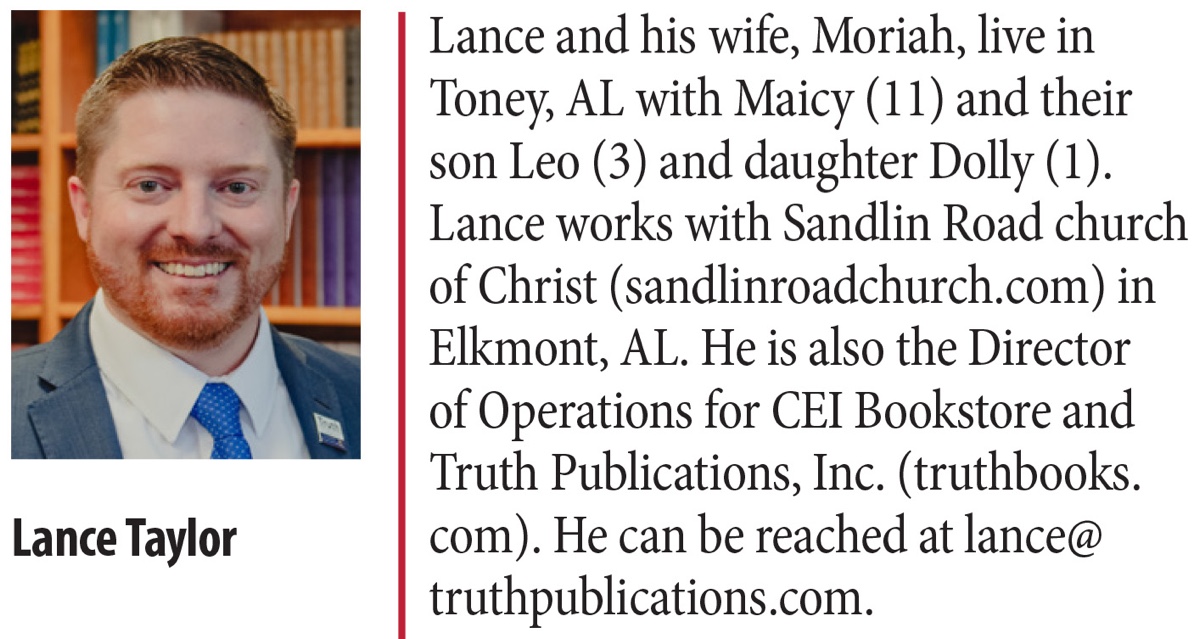By Lance Taylor
Synopsis: As brethren seek to restore what they have lost/missed over the last two years, let us remember an essential truth: Nothing beats face-to-face Bible study!
Since the pandemic of 2020, face-to-face interactions have changed in seemingly every arena of our lives. One significant area of impact has been Bible studies and Bible classes among saints and congregations across the globe. As we strive to hold fast to the most holy faith, continuing in effective Bible study is of utmost importance. There simply is no replacement for in-person Bible study participation.
The pandemic brought trials of various alternative means of study. Even in the secular field of education, schools attempted distance learning, virtual classrooms, and providing online resources to continue the progress of children and young people across the country. What resulted from that approach? Consider the reports from several sources in the following article: “Virtual school resulted in ‘significant’ academic learning loss, study finds” by Jessica Dickler, which was posted to CNBC.com on 3/30/21 and updated on 10/12/2021:
Nothing beats being in a classroom.
After a year of school closings and distance learning amid the coronavirus crisis, more than half of public school K-12 teachers said the pandemic resulted in a “significant” learning loss for students, both academically and from a social-emotional standpoint, according to a report by Horace Mann.
Data from the Centers for Disease Control and Prevention also suggested that virtual learning “might present more risks than in-person instruction related to child and parental mental and emotional health and some health-supporting behaviors.”
Nearly all—over ninety-seven percent—of educators reported seeing some learning loss in their students over the past year when compared with children in previous years, and a majority, or fifty-seven percent, estimated their students are behind by more than three months in their social-emotional progress, Horace Mann found.
A separate study by McKinsey & Company found similar results worldwide. The majority of teachers from eight different countries said that remote learning is a poor substitute for being back in the classroom.
The U.S. and Japan gave distance learning the harshest scores overall, with a majority of teachers ranking the effectiveness only slightly better than skipping school completely.
Economic status mattered, too. Educators in schools in areas with higher poverty found virtual classes to be especially ineffective, heightening concerns that COVID-19 exacerbated educational inequalities.
If our general education systems recognize the negative impact of not being in the classroom, face to face, with in-person instruction and teaching, then certainly, as Christians, we can also see that, if we do not resume or move forward with regular in-person Bible study and teaching, we will also experience “significant learning loss for students of the Bible.”
Working in the book industry, I have witnessed firsthand the ups and downs of congregations through the pandemic and recovery, as we all have attempted to return to normal worship and Bible study. The challenges have been manifested in several ways, but especially in the lack of Bible class materials being purchased during the pandemic and the slow return of the sales of those materials in 2021, and now 2022. While there has been growth back to some levels of “normal,” it seems that we are all still “off,” to some degree, with Bible class activities. In many places, brethren are not back to where we should be.
I am reminded of Paul’s words to Timothy: “You, therefore, my son, be strong in the grace that is in Christ Jesus. And the things that you have heard from me among many witnesses, commit these to faithful men who will be able to teach others also” (2 Tim. 2:1-2).
This admonition has echoed through the Lord’s church for years as a call to be steadfast in the teaching of the Scriptures in order to secure the continuation of biblical teaching in generations coming after us.
In my short nineteen-plus years of preaching the gospel, I have had the privilege of teaching many young people. When I was first given the opportunity to preach, my responsibilities specifically included teaching the teenagers and young people of the congregation. One thing that has always been evident in young people learning the Bible is that they absorb so much so fast when provided consistent and organized instruction. Another trait that stands out over the years is the curiosity and inquisitiveness of our young people. They are searching every day for answers and information as they are discovering themselves, growing into their own persons, and maturing in their physical and spiritual lives. So, what happens when they miss weeks of in-person Bible classes?
We all have likely seen the impact that Bible class has on youth in simple ways, such as hearing our children singing every word of the song “Jesus Loves Me” and “This Little Light of Mine.” Each week at Sandlin Road we have a children’s singing and Bible drill. I am reminded every week of just how much even a small child’s mind is capable of learning and retaining. To see an eighteen-month-old little girl sing and do hand motions to “My God Is So Big” will melt your heart and humble you as a Bible teacher. What if we skipped eighteen months of singing and teaching these little ones?
It is not just our children who fall behind when we lose focus on Bible study and classes. Remember the example of Apollos when Priscilla and Aquila “took him aside and explained to him the way of God more accurately” (Acts 18:24-26)? Then he went on to Achaia and “greatly helped those who had believed through grace; for he vigorously refuted the Jews publicly, showing from the Scriptures that Jesus is the Christ” (vv. 27-28). In this, we see the benefits of Bible teaching that is personal, tactful, and helpful. It was a blessing for Apollos and also for us. We also see the power of in-person Bible teaching and preaching when Apollos helped other brethren and refuted the unbelieving Jews. What if we do not mentor the next generation of gospel preachers and Bible teachers?
In Acts 20:17-38, Paul emotionally expresses his work among the church at Ephesus. The entire text affirms the positive impact of being together, in person, to learn and live the gospel message. In verse 20, Paul specifies that he “taught you publicly and from house to house.” Then, in verse 25, he laments the fact that those he has taught will “see his face no more.” In verses 36-38, as Paul kneels and prays with the elders, they wept and fell on his neck and kissed him, “sorrowing most of all for the words which he spoke, that they would see his face no more.” As a Bible teacher, I would sorrow over the thought of seeing faces no more in the classroom, in the auditorium, and in homes where the Bible would (and should) be studied together. Wouldn’t you?
God has instructed us to teach and share His word directly with one another. In Deuteronomy 6:6-9, the children of Israel were commanded concerning God’s word:
. . .they shall be in your heart. You shall teach them diligently to your children, and shall talk of them when you sit in your house, when you walk by the way, when you lie down, and when you rise up. You shall bind them as a sign on your hand, and they shall be as frontlets between your eyes. You shall write them on the doorposts of your house and on your gates.
Do you gather that teaching God’s word was to be an important part of everyday life? Absolutely! It was to be taught repeatedly and consistently!
Paul also states the importance of this dedication to such instruction several times in his letters. In 1 Corinthians 4:17, as he implores the Corinthian brethren to heed his words, the apostle speaks of sending Timothy to them (in person) to “remind you of my ways in Christ, as I teach everywhere in every church.” In verse 16, Paul stated, “Therefore I urge you, imitate me.” He was their father in the gospel and their teacher among other instructors in Christ, but note that he wants them to see Timothy’s example of Paul’s ways in Christ (in person) and hear him teach Christ (in person).
What have we potentially lost during these challenging times? Have we lost weeks, maybe months, of Bible study and in person classes? Seeing Christianity modeled by one another and especially those in leadership in the Lord’s church as teachers and mentors? It is time to return to committed efforts to teach and make disciples with in-person Bible study and classes for all ages!
Undoubtedly, we have faced uncertain days and encountered real challenges over the last several years. Yet, the word of God holds the answers to all that we face. Therefore, the need to share God’s word with one another in person, and to learn more from the Scriptures, is real now, perhaps more than ever. Losing spiritual knowledge and stunted growth are equally real when we neglect the continued teaching of God’s word. Let us be those who will press on in teaching and studying the Bible together, face to face!
Biblical quotations come from The New King James Version (NKJV). Nashville: Thomas Nelson, 1982.
Dickler, Jessica. “Virtual School Resulted in ‘Significant’ Academic Learning Loss, Study Finds.” CNBC.com. March 30, 2021. https://www.cnbc.com/2021/03/30/learning-loss-from-virtual-school-due-to-covid-is-significant-.html.


